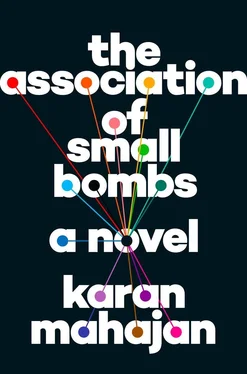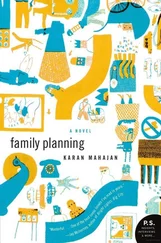Deepa, in the drawing room, propped her head against him and cried.
Afterwards, she said, “I made a mistake. There’s nothing we can do. We can never catch the people who did this. They’re a thousand kilometers away.”
“Deepu, darling, you can’t believe just one newspaper report.”
“But it’s the Hindu .”
“It’s put together by people like me,” he said. “Look at me. Of course it lies.” As he said this, he cast his eye around the drawing room. What a decrepit room it was. A sideboard stood next to the dining table, full of generic award plates you see in doctors’ offices — prizes from meaningless film associations, trophies won by the boys on sports day, medals from galas at the Friends Club. Closer, past the cheap, laminated fake wood surface of the dining table, wood the color of dark ale, eagerly foaming up any white impurity or dirt, lay the centerpiece of the shabby sofas pushed against the windows, windows that faced the adjacent building and were alive with dust, birds, chirping, the horrible guttural fever of sunlight. A maroon, moth-eaten, uneven carpet covered the floor. Somewhere, out of view, hiding behind a book on the sideboard, a clock ticked. Deepa was on her knees before Vikas now, crying. He had an erection — not from desire, but from a kind of excess vividness, the noises of the complex (the birds, the projecting hawkers, the grumbling servants, the hammering of new construction in the neighbor’s plot), building symphonically around the central instrument of the crying woman: he wanted to fuck the house, to fuck every little particle he could see.
The house changed shape and color with passing clouds, like a woman angrily putting on and taking off clothes in a changing room. “Don’t cry,” he told his wife, inhaling the smell of cakes from her hair, and then he cried too.
________
The trucks came every day at eleven, emptying their bricks and cement pipes and the load of construction workers before the snazzy gates of the neighbor. Vikas watched it from the window, drinking tea, tending to a fire in his stomach. Since the day of the blast, he had eaten very little — had come to subsist, like so much of the starving subcontinent, on tea; he loved tea, loved caffeine, felt naked without a cup at the end of his long fingers, giving him a reason to drop from his height and drink; he felt there was no harm now in indulging his worst habits — what was the worst that could happen, you’d fall sick? Tear away your stomach lining like the great French writer Balzac, so that you’d have to snort lines of coffee, chew tobacco? Bad things were going to happen to you anyway. Humans, especially bourgeois humans, were not meant to handle this kind of stress.
He had not worked on his film project since the day of the bombing— Scenes from a Marriage , a documentary about divorce in India, so named in tribute to his favorite auteur, Ingmar Bergman (how would Bergman’s sharp bourgeois melodramas hold up against a bomb? he wondered). He couldn’t bring himself to do it, couldn’t tear himself from this window, which was like a portal into heat, death, futility, irritation — and also a stage. What had happened to him was so real, he couldn’t reenter the world of make-believe — yes, that was the work of a documentary filmmaker too: make-believe. It was artificial as anything else. You found a location, staged a scene or an interview, blocked out your story beforehand (after months of pleasant research on the subject), and then edited and reshot for effect. But all this seemed now to Vikas like a kind of tedium. He couldn’t look at the footage from Scenes from a Marriage , listen to the complaints of married women, try to carve a meaningful narrative from their frayed individual stories. To make a documentary out of many stories was to make a family out of inmates in different cells of a jail. It wouldn’t work. Or it would, but it would have the same sickly futile simultaneity of jail.
“I just want to be here with you,” he told his wife when she expressed concern about him. “And how will it matter if I don’t work for one or two months? It’s not like I make any money. You make a lot more money than me — in fact, I should be your assistant.”
“You’ll get more depressed being home,” she said.
“I’ll read,” he said with a smile. “I’ll catch up on various things.” But there was something off and light and overly optimistic about his tone and he knew it too.
When Deepa started crying again, he said, “What’s the matter, Deepu?”
Throughout their marriage, he had marveled at how little she cried, how she never used tears to blackmail him, and in the past few weeks, there had been something particularly awful about watching this lovely, tough woman reduced to a shivering mess. But now, strange as it was, he was getting tired of it. He only had enough space for his own grief.
“I’ve lost not just Tushar and Nakul but you too,” she said.
Vikas hugged her and made a savage mental note that they shouldn’t be left alone like this, that there should be a relative present at all times to diffuse their grief into politeness. But he couldn’t argue with her. He was growing distant from himself , floating away above his body. Sometimes he felt, when he was in front of the window, that he wasn’t standing there but was looking down at the entire city from a blimp in the stratosphere, seeing the blackened roofs and the water tanks and the trees and the roads as one sees them on architectural plans: not dirty and ruined, as in reality, but clean and serene, occupied by no one.
________
He started going again for his evening walk, his heart murmuring, his legs wobbly; it was his attempt to get back in touch with his body. But his mouth would be dry by the time he’d walked to the T-junction, and he’d turn back and go home. Each time he saw a neighbor, he bolted into the safety of his flat. He’d become a proper recluse. At the same time, since his wife had planted the seed, the idea of work was in his head. How to make a documentary about terror?
The thing was, he didn’t want to make a film about the aftermath; he was living the aftermath. No — he wanted to make a film about the moment itself, when there was a hush as the bomb shut off humans and machines in the vicinity and then viciously rearranged everything. Yes, he wanted to film the moment itself, slow it down, open it up like a flower over time, like the ultraviolent bomb dreams that filled his nights.
The dreams had been growing. At first he had seen the eye, bloody and syncopated and concocted, opening. Then the visions had become stereoscopic, his mind racing out in many directions to places like Sadar Bazaar, Faridabad, Indranagar, Rohini, Gurgaon, Sabzi Mandi — places where the news of the bomb turned into muddy rumor, as if his mind wished to establish a circumference for his grieving, come back with all the places that didn’t know about it, that certified its smallness.
And yet there was something these dreams couldn’t approach. How to be present, he wondered, for the moment itself? How to know when a bomb was about to go off? A few years ago, during a lull between documentaries and commercials, he had become interested in the functioning of futures markets, and he wondered now: Was it possible to put together a futures market for bombs? Surely there were people with information about terrorism that a market would happily sponge up. No, Khurana, don’t dream. He’d have to be more specific than that, more practical. Surely there were times of the year and markets (real markets, not the abstract entities of economics textbooks) in which blasts were concentrated. Crowds attracted bombs. So did festivals and political rallies. There were festivals almost every day in Delhi — festivals of life, death, birth, benediction, and general sorrow and repentance, staged by obscure sects of Hindus, Muslims, Jains, Christians.
Читать дальше












